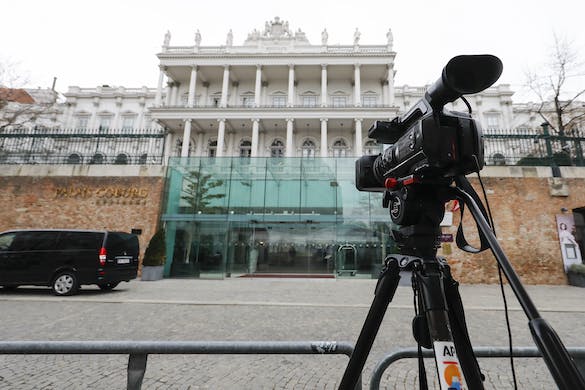Biden’s Charge Toward Iran Nuclear Deal Sends Opposition Scrambling
Cruz threatened to “severely, if not terminally” hamper any deal unless Congress reviewed and voted on it.

The focus is intensifying on whether a bipartisan group of senators and leaders of America’s top Mideast allies can to stop President Biden in his race to re-enter the 2015 Iran nuclear deal.
“It’s clear from this morning’s briefing that Joe Biden and his representatives are committed to a deal at all costs, which will boost the Iranian regime and ultimately gift them a nuclear arsenal,” a spokesman for Senator Cruz told the Sun.
The Democratic chairman of the Senate Foreign Relation Committee, Robert Menendez of New Jersey, emerged from a committee hearing with Mr. Biden’s Iran point man, Robert Malley, telling reporters that what he heard was “a very sobering, challenging reality.”
Members of the Biden administration now say the end of February is the deadline to strike a deal. This so-called urgency is nothing new.
As far back as last fall, when the Vienna nuclear negotiations resumed, those same officials insisted they were weeks away from walking out on the negotiations. Well before Groundhog Day, they kept returning to Vienna for seemingly endless rounds of talks, always with a “deadline” attached.
At the start of yet another such round, Mr. Malley today held a virtual briefing of the Senate committee from Vienna. He spoke to the House Foreign Affairs Committee yesterday. It was the first time since the Vienna talks resumed that Mr. Malley interacted with elected legislators.
In a letter to the Biden administration signed by 33 senators, Mr. Cruz, a Republican of Texas, on Monday threatened to “severely, if not terminally” hamper any deal unless Congress reviewed and voted on it. To that effect, he wrote, “We are committed to using the full range of options and leverage available to us United States Senators.”
Separately, Mr. Biden on Sunday spoke on the phone with Prime Minister Bennett, who made clear Jerusalem opposes a return to the 2015 deal and, as a non-party to it, will maintain all options it has to stop Iran’s nuclear ambitions.
“The agreement and what appear to be its conditions will damage the ability to take on the nuclear program,” Mr. Bennett said.
“Whoever thinks an agreement will increase stability is wrong,” he added. “It will temporarily delay enrichment, but all of us in the region will pay a heavy, disproportionate price for it.”
Similar, albeit much quieter, pleas for caution in making deals with Tehran were made by leaders of Saudi Arabia, the United Arab Emirates, and other Arab neighbors of Iran.
The mounting, bipartisan congressional opposition to a deal may have given pause to some administration officials.
In 2015, President Obama reversed a constitutionally mandated oversight function that gives the Senate ratification powers over international treaties. Most major disarmament agreements were thus ratified until that point.
In 2015, though, a Republican-dominated Senate was moving to stop the Iran deal, rather than ratifying it. That measure was defeated by a Democratic filibuster, even as a bipartisan majority of 58 Senators supported it.
The 2015 experience points to a risk that the current congressional pressure could fail to stop the deal Mr. Miley is cooking up in Vienna. If a deal were to be reached but not ratified by the Senate, it could prove weak, as was the case with the original deal, from which President Trump withdrew in 2018.
Currently, the Iranian delegation in Vienna is demanding the American side guarantee that the next president would stick with any new deal. Even if the renewed congressional pressure against Mr. Biden’s rush to ink a deal fails, it strongly signals that, unless endorsed by the Senate, any such pact will be temporary — and depend on who resides at the White House.
The stakes are high, as according to Israeli sources, Iran can produce the amount of highly enriched uranium needed for a nuclear bomb in four to six months. That is a shorter breakout time period than Washington’s assessment, six to nine months — and even shorter than the full year the original 2015 Iran deal was supposed to guarantee, according to its supporters.
Additionally, neither the original deal nor current proposals address Iran’s means of delivery. Today, Iran reported a successful test of Kheybar Shekan, its newest ballistic missile. According to state-controlled Tehran media, it has a range of 870 miles with “pinpoint accuracy.”
“Iran’s evolving missile power is making the regime more risk tolerant and confident that it can deter and coerce enemies,” says Behnam Ben Taleblu of the Foundation for Defense of Democracies. “The better the technology or military capabilities, the more aggressive the regime will be.”
Mr. Biden has already started to reverse sanctions imposed by Mr. Trump. In Vienna, Iranian diplomats are hoping for an even bigger windfall — a pile of cash to fuel their deadly campaign of exporting the violent Khomeini revolution to the Mideast and beyond.
Congressional opposition, as well as pressure from allies, will likely intensify if a deal nears. It remains to be seen whether it can succeed this time.

